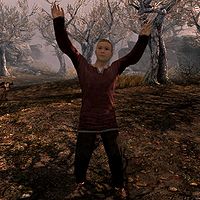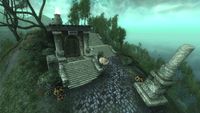Lore:Pelagius III
| Emperor Pelagius III | |||
|---|---|---|---|
 Emperor Pelagius III
Emperor Pelagius III |
|||
| Race | Breton | Gender | Male |
| Born | 3E 119 |
||
| Died | 3E 153 Betony |
||
| Resided in | Imperial City Solitude Wayrest Betony |
||
| Reign | 3E 145- 3E 153 |
||
| Previous Ruler | Magnus Septim | ||
| Next Ruler | Katariah | ||
| Appears in | Skyrim | ||
Pelagius Septim III (born Thoriz Pelagius Septim)[1] (known as Pelagius the Mad)[2] was the twelfth emperor of the Septim Dynasty, reigning over the Third Empire for eight years, from 3E 145 to 3E 153. Pelagius III is generally remembered for his eccentricities of behavior and madness that characterized his time as King of Solitude and later as Emperor of Tamriel.[1] He was preceded by his father, Magnus, and was succeeded by his wife, Katariah.[2]
Contents
Biography[edit]
Early Life[edit]
Thoriz Pelagius Septim was born in 3E 119 to the King of Wayrest, Magnus Septim,[nb 1] and his wife Hellena.[nb 2][1][2][3] He was named Pelagius after his grandfather, Emperor Pelagius II.[4] Pelagius had a sister named Jolethe in addition to brothers and another sister.[1] Pelagius' mother instilled in him from a young age that danger could come from anywhere, which made him paranoid.[5] He suffered night terrors from a young age.[5]
In 3E 121, the War of the Red Diamond broke out and split the Empire in half.[6][2][7] After Pelagius' cousin Uriel III was crowned Emperor of Tamriel, Magnus allied with Pelagius' uncle Cephorus Septim to oppose Uriel III and Pelagius' aunt Potema the Wolf Queen.[2][4]
In 3E 127, when Pelagius was eight, Cephorus defeated Uriel III at the Battle of Ichidag in Hammerfell, and a mob killed Uriel III following the battle, so Cephorus was proclaimed emperor.[8][3][2][9] Cephorus I's accession marked the official end of the War of the Red Diamond, but the next decade was a period of constant warfare against Potema.[2][8][10] In 3E 137, Pelagius took part in his first battle at the Siege of Solitude, which ended when Potema died after a month-long siege of the Blue Palace.[10][2][8][1] After the siege, Pelagius was placed on the throne of Solitude, and the Moot chose him as High King of Skyrim.[1][8][11]
King of Solitude and High King of Skyrim[edit]
It is difficult to say when Pelagius' madness first manifested itself, but prior to his accession to the throne of Solitude, he was described as personable, and interested in sports, magic, and music.[1][8] However, once Pelagius became King of Solitude, his eccentricities of behavior began to be noticeable.[1] Some believe that Potema caused his eccentricities of behavior, though Bretons like to boast that it was his time in High Rock that drove him mad.[10][8][12] During his first two years as king, Pelagius experienced alarming shifts in weight, which visiting diplomats noted.[1] Four months after taking the throne, a diplomat from Ebonheart described Pelagius as "a hale and hearty soul with a heart so big, it widens his waist"; five months after that, the princess of Firsthold wrote to her brother that when Pelagius gripped her hand, it felt like being clutched by a skeleton.[1]
In 3E 140, Cephorus I died after falling from his horse, so Magnus acceded to the Ruby Throne.[2][8][3] Magnus was already elderly when he became emperor, so Tamriel focused its attention on Magnus' oldest living child, Pelagius.[2][1] By the time Magnus became emperor, Pelagius' eccentricities were becoming infamous.[1] There are many legends about Pelagius' eccentricities of behavior as King of Solitude, but few well-documented incidents exist.[1] It is known that Pelagius locked the princes and princesses of Silvenar in his room with him, only releasing them when an unsigned Declaration of War was slipped under the door.[1] In another incident, he tore off his clothes during a speech he was giving at a local festival, and his advisors began to watch him more carefully after the incident.[1] By 3E 141, Pelagius' behavior is recorded as "occasionally eccentric" in the Imperial Annals.[8]
In 3E 141, on the orders of Magnus, Pelagius was married to the Dunmer, Katariah Ra'athim, Duchess of Vvardenfell.[1][8] Magnus had Pelagius married to Katariah to try and cement relations with Ebonheart, the seat of power for the Ra'athim Clan.[1] Magnus also had Pelagius married to Katariah because he hoped that Katariah's shrewdness as a diplomat and beauty would hide the madness of Pelagius.[1]
Emperor of Tamriel[edit]
On the 8th of Second Seed, 3E 145, Magnus died quietly in his sleep.[1][8][3] Legend accuses Pelagius of patricide, but this is generally dismissed as false because Pelagius was the King of Solitude, so he seldom visited the Imperial City.[10][2] Jolethe took over the throne of Solitude, and Pelagius and Katariah rode to the Imperial City, where he was crowned Emperor Pelagius Septim III.[2][1][3] Another legend holds that at his coronation, Pelagius III fainted when the Red Dragon Crown was placed on his head, but Katariah held him up so only those closest to the Ruby Throne could see what had happened.[1]
Before becoming emperor, Pelagius III's eccentricities were already fairly well known, but it was only during his reign as emperor that he became known as "Pelagius the Mad".[10][8] Pelagius III's reign as emperor was detrimental to his mental state.[1][2] When the Argonian ambassador from Blackrose visited the Imperial Court, Pelagius insisted on speaking in all grunts and squeaks, which is how he perceived the Argonian language, Jel.[1] He embarrassed dignitaries, offended his vassal kings, and, on one occasion, marked the end of a grand ball by attempting to hang himself.[2] He was obsessed with cleanliness, and many guests reported waking to the noise of an early-morning scrubdown of the Imperial Palace.[1]
Pelagius III never truly ruled Tamriel; instead, Katariah and the Elder Council made all the decisions.[1][13] In 3E 147, Pelagius began biting and attacking visitors to the Imperial Palace, so he was sent to a private asylum, and Katariah was proclaimed empress regent.[1][2][9] For the next six years, Pelagius was sent to a series of healers and asylums in High Rock, Valenwood, Elsweyr, and Black Marsh.[1][2][14] Shortly after the Emperor was sent away, Katariah visited his cell, and she became pregnant with Pelagius' child.[1] Katariah later gave birth to their son, Cassynder.[1][2]
In 3E 153, Pelagius III died on a warm night in Sun's Dawn after a brief fever in his cell at the Temple of Kynareth on the Isle of Betony, and Katariah was officially crowned Empress of Tamriel.[1][2][3] While on his deathbed, Pelagius issued a decree that outlawed death.[5]
Legacy[edit]
The 2nd of Sun's Dawn, which may or may not be the anniversary of his death (records are not clear), is celebrated as Mad Pelagius Day, the time when foolishness of all sorts is encouraged.[1][12] By the late Third Era, some citizens of the Shivering Isles considered Pelagius to be an honored madman.[15] The Temple of Kynareth in which Pelagius died was destroyed after his death.[16] A group of heretics known as the Apostles later took the stones of the temple, and rebuilt it in exact detail in the Shivering Isles.[16] The rebuilt temple was known as the Howling Halls because it was said that Pelagius' screams could still be heard in the building.[16] The pelvis of Pelagius was discovered in the Howling Halls in 3E 433, and was put on display in Crucible.[17]
Shortly after Pelagius' death, the southwest wing of the Blue Palace, known as the Pelagius Wing, was locked, and servants only entered once a year to clean it, so the wing fell into a state of disrepair.[11][18] The Pelagius Wing was rumored to be haunted by the ghost of Pelagius.[11][19][20]:422
Even in death, Pelagius was trapped by his own madness.[21] In 4E 201, in Solitude, the Last Dragonborn was asked by Dervenin, the Priest of Mania, to find Sheogorath, and they received the hip bone of Pelagius.[21] The Last Dragonborn entered the Pelagius Wing, where they were transported into the dead emperor's mind.[21] The Mad God was on vacation within Pelagius' mind, whom Sheogorath considered to be an old friend.[21][5] The Prince of Madness tasked the Last Dragonborn with cleansing Pelagius' mind of paranoia, suspicion, self-doubt, anger, and torment using the Wabbajack.[21] This finally allowed Pelagius some peace, and Sheogorath and the Last Dragonborn left him to his rest.[21]
Gallery[edit]
Notes[edit]
See Also[edit]
- For game-specific information, see the Skyrim article.
References[edit]
- ^ a b c d e f g h i j k l m n o p q r s t u v w x y z aa ab ac ad ae The Madness of Pelagius — Tsathenes
- ^ a b c d e f g h i j k l m n o p q r Brief History of the Empire v 2 — Stronach k'Thojj III
- ^ a b c d e f The Third Era Timeline — Jaspus Ignateous
- ^ a b The Wolf Queen, v7 — Waughin Jarth
- ^ a b c d e Sheogorath's dialogue in Skyrim
- ^ The Wolf Queen, v6 — Waughin Jarth
- ^ The Knights of the Nine — Karoline of Solitude
- ^ a b c d e f g h i j k l The Wolf Queen, v8 — Waughin Jarth
- ^ a b Tamriel's Timeline, The Daggerfall Chronicles — Ronald Wartow
- ^ a b c d e Biography of the Wolf Queen — Katar Eriphanes
- ^ a b c Walking the World, Vol XI — Spatior Munius
- ^ a b Holidays of the Iliac Bay — Theth-i
- ^ Pocket Guide to the Empire, 3rd Edition: All the Eras of Man, A Comprehensive History of our History — Imperial Geographical Society, 3E 432
- ^ The Asylum Ball — Waughin Jarth
- ^ Una Armina's dialogue in Oblivion: Shivering Isles
- ^ a b c Ra'kheran's dialogue in Oblivion: Shivering Isles
- ^ Events of The Museum of Oddities in Oblivion: Shivering Isles
- ^ Una's dialogue in Skyrim
- ^ Falk Firebeard's dialogue in Skyrim
- ^ The Elder Scrolls V: Skyrim: Prima Official Game Guide — David Hodgson
- ^ a b c d e f Events of The Mind of Madness in Skyrim
Note: The following references are considered to be unofficial sources. They are included to round off this article and may not be authoritative or conclusive.


